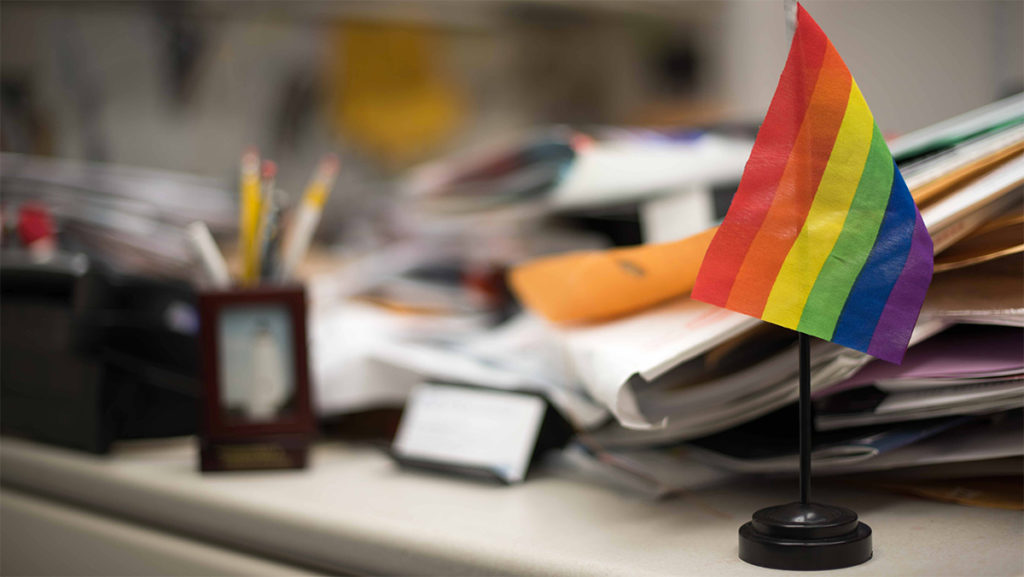Following the success of the first ZAP panel geared toward faculty and staff held last year, the Center for Faculty Excellence will host a second one Nov. 3 with the hopes of attracting a similar turnout.
ZAP panels are intended to create an open and welcoming setting where individuals can ask questions to a group of LGBT students about their experiences. Typically, ZAP panels are about LGBT themes, but the idea to hold a ZAP panel has been used by other groups on campus to raise awareness for other reasons.
Luca Maurer, program director for the Center for the LGBT Education, Outreach and Services, said the idea for the panel originated during a conversation between him and a student last year, both of whom agreed that faculty would benefit greatly from this opportunity. Maurer reached out to Wade Pickren, the director for Center for Faculty Excellence and Sponsored Research, to coordinate a ZAP panel for a faculty audience, an idea he said Pickren received with enthusiasm.
“IC students, faculty and even some administrators insisted that we be as inclusive as possible — not just in lip-service but in our actions,” Pickren said.
The panel will be presented by the LGBT center. Maurer said he hopes this year’s panel will draw the same turn-out as last year’s: a standing-room-only crowd.
During the event, a group of panelists will be seated at the front of a classroom while facing a group of inquiring individuals, composed of faculty, staff, administrators and students. The panelists are organized by senior John Jacobson, and the group includes students from different majors to give the faculty a more well-rounded experience.
“It’s also a very nice opt-in learning experience for them, if they are interested, or if their colleagues think they maybe should go to something like this,” Jacobson said.
Pickren said the main goal of the ZAP panel is distributing information. He said not many faculty members know about the different types of gender identities and sexualities that exist.
Senior Aaron Roberts, who attended the previous panel, said some common themes students discuss within the panel are their coming-out stories, identification of personal identities and what it was like for them to grow up in their communities as LGBT members.
“It’s really important to have these stories be told so that people can hear them,” Roberts said. “But to have someone actually sitting in the room telling you to your face, ‘This is what happened to me,’ is really powerful.”
Maurer said he discovered that when these ZAP panels were held in the past for students, faculty members never had the opportunity to ask their questions in a setting that was safe and free from embarrassment. Maurer said the panel last year, which was geared specifically toward faculty and staff, elicited many great questions, all phrased in a way that showed how much they cared about learning and understanding the students.
“Some of them phrased their questions in terms of, ‘I want to make sure I’m serving LGBTQ+ students as best as I can,’” Maurer said.
Jacobson said these panels give students a way to approach their faculty in a setting that is open and safe. Some students wanted to bring up specific LGBT topics in class but felt unwelcome to do so simply because they didn’t want to overstep their boundaries as a student and upset the professor.
“The faculty and staff — people involved have a desire to be open to that education and to that understanding, and I think that creates a positive experience,” Jacobson said.
The panel bridges the information and empathy gap, Maurer said. He also said the faculty adopts the ability to view LGBT students as not only whole individuals but also multidimensional people, meaning that while these students are part of the college community, they are also part of a much smaller community of LGBT students.
Maurer said these panels are a great opportunity for the students as well because they can hone in on their public speaking skills and form a sense of community. The panel helps to advance the understanding of different sexualities on campus, but also allows students with similar backgrounds to bond. Roberts said his experience on the panel is always positive.
“It is very empowering to tell your own narrative to faculty and staff who maybe don’t always get to hear that,” Jacobsen said.
Alternatively, Jacobson explained that the panels are not always comfortable. Sometimes, during the panel, questions that are asked by someone who doesn’t understand the topic or that are not phrased tactfully can become upsetting and stressful to some students and faculty.
“The joy of having the panel is that we can work on addressing why that’s uncomfortable, and we can hopefully work towards a better understanding of it,” Jacobson said.














